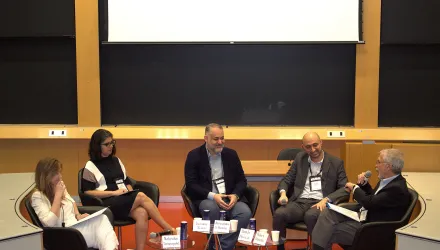Those worried about the future of the earth's climate are hoping that the climate-change convention in Lima, Peru, in December 2014, will yield progress toward specific national commitments to reduce greenhouse-gas (GHG) emissions. The Lima conference will be hosted by the United Nations Framework Convention on Climate Change (UNFCCC) and is a prelude to the make-or-break Paris meeting of the UNFCCC, in December 2015, where a new international agreement is scheduled to be concluded.
The Paris agreement will include voluntarily-submitted pledges from UNFCCC member countries to reduce GHG emissions. For such a system of emission targets to work, there needs to exist some general notion of what is a fair target for a country to accept, depending on its circumstances. This would allow a scorecard of which countries are doing their fair share and which may not be.
Everyone should participate in taking on targets. But it is only fair to take into account countries' individual circumstances, especially their standards of living. Fortunately, it is possible to describe and even to quantify what targets can be considered fair and reasonable. Three principles:
- Latecomer Catchup: It is fair to expect countries that have increased their emissions rapidly to bring them back down, but not practical for them to reverse fully and instantly.
- Progressivity: It is fair to expect rich countries to accept bigger cuts than poor countries, measured relative to what their emissions paths would otherwise have been (the so-called "Business as Usual" path, or BAU).
- Cost: It is not reasonable to expect any one country or group of countries to agree to cuts that would result in disproportionately large economic costs for them.
It turns out that the emissions targets that countries have agreed to or voluntarily submitted in the past—at Kyoto and at Cancun—tend statistically to be consistent with a formula that quantifies the three principles. In particular, countries that were richer or that had increased their emissions faster agreed to steeper cuts than others. Among the countries agreeing to targets at Kyoto, every ten percent increase in income per capita corresponded to an agreed emissions reduction of another 1.4 per cent relative to BAU. In the initial voluntarily-submitted Cancun targets, every ten percent increase in income corresponded to another cut of 1.6 per cent relative to BAU.
The target paths also embodied a "latecomer catch-up factor" that pulled each country back toward what its emissions had been in 1990. If the formula is extended through the remainder of the century with gradually decreasing weight on the past and gradually increasing weight on per capita targets, model estimates show no country suffering a loss of more than 1 per cent of GDP in present discounted value.
Such an approach makes it possible to judge who in the current negotiations is now proposing to do their fair share, who is proposing to do more, and who less. Now that all three of the biggest emitters—China, the United States, and the EU—have announced post-2020 Paris targets, the formula could be recalibrated for the coming round. These three key data points are enough to identify the equation's parameters for 2025 or 2030, which in turn could help other countries decide what future targets are appropriate for them. Thus this statistical yardstick for judging fairness can continue to serve as a powerful tool for establishing what share of the burden is appropriate for each country to take on.
Valentina Bosetti, Fondazione Eni Enrico Mattei
Jeffrey Frankel, Harvard Kennedy School
Viewpoints present policy proposals, considered opinions, and commentary by distinguished policymakers, leaders from business and non-governmental organizations, and scholars. The Harvard Project on Climate Agreements does not advocate any specific climate-change policy proposals. Statements and views expressed in Viewpoints are solely those of the authors and do not imply endorsement by Harvard University, the Harvard Kennedy School, or the Harvard Project on Climate Agreements.
Bosetti, Valentina and Jeffrey Frankel. “A Pre-Lima Scorecard for Evaluating which Countries are Doing Their Fair Share in Pledged Carbon Cuts.” Harvard Project on Climate Agreements, Belfer Center, November 2014





